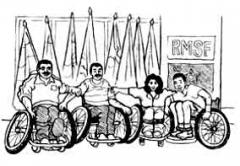Your progress
0%

Recreation, leisure and sports activities play an important role in communities. Their many benefits include:
Recreation, leisure and sports activities may involve individuals, small groups, teams or whole communities and are relevant to people of all ages, abilities and levels of skill.
See how people with disabilities in Morocco are able to participate in sporting clubs and events.


Sport as a Tool for Social Inclusion and Personal Development is a project launched by Handicap International in Morocco in 2007. The purpose of the programme was to increase the opportunities for those people with disabilities to be involved in sports and address inequalities in access to rehabilitation, health care and social integration.
The programme focused on three areas:
Programme staff worked closely with the Royal Moroccan Sports Federation (specialists in mainstream sports but with limited expertise in disability) and around 600 Moroccan disability associations specializing in health and education for people with disabilities. The programme assisted them to develop strategic, national and international partnerships. It also offered support to small projects and sports clubs for people with disabilities by offering trainings in management skills, project development, proposal writing and fundraising.
This included wheelchairs, appropriate clothing, and adapted equipment, such as balls which make noise for the blind.
Sporting events such as the Race for All held on the International Day for Disabled Persons attracted approximately 2,000 runners both with and without disabilities. A high profile football tournament for players with disabilities was also held and sponsored by the King of Morocco. Its final game was broadcast on national television to an audience of approximately 20,000 people.
The programme had a number of outcomes: